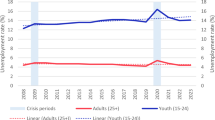Abstract
This paper provides an account of Professor Radha Kamal Mukerjee, highlighting his significant contributions to research in the area of labour and employment. It focuses on Professor Mukerjee’s inter-disciplinary approach to research and traces the eventful years of his scholarly journey. His seminal work, The Indian Working Class, was first published in 1945 and was mostly based on extensive fieldwork by the author in different parts of India over two decades. The present paper discusses Professor R.K. Mukerjee’s ideas, approaches and agenda on some important aspects of labour as contained in his book and attempts an assessment of the progress vis-à-vis the same over the last 70 years. It concludes that the relevance of his ideas, approaches and agenda remain undiminished even after a long span of 70 years.
Similar content being viewed by others
References
American Journal of Sociology (1926), Vol 32, No 3, (November), University of Chicago Press, Review of the book Regional Sociology by Robert L. Park, pp 489.
American Sociological Review (1950), Vol 15, No 1, (February), American Sociological Association, Review of the book The Social Structure of Values by Robin M Williams Jr., pp 141–142.
Economica New Series (1934), Vol 1, No 4, (November), Wiley for London School of Economics and Political Science, Review of the book Land Problems of India by Vera Austey, pp 492.
ILER (2014), India Labour and Employment Report, Academic Foundation and Institute for Human Development, New Delhi.
Joshi, P.C. (1986), “Founders of the Lucknow School and Their Legacy: Radha Kamal Mukerjee and D.P. Mukherjee: Some Reflections”, Economic and Political Weekly, 16 August, Vol 21, No 33, pp 1455–1469.
Journal of Political Economy (1943), Vol 51, No 1, (February), University of Chicago Press, Review of the book The Institutional Theory of Economics by Allan G Gruchy, pp 84–85.
Loomba, Ram Murti (1987), “Radha Kamal Mukherjee: Life, Work and Philosophy”, in R.M. Loomba and G.R. Madan (eds.), Society and Culture: In Honour of Late Radha Kamal Mukerjee, Allied Publishers Pvt. Ltd., New Delhi, pp xvii-xviii.
Mondal, Pooja (ed.), “Radha Kamal Mukerjee: Biography and Contribution to Sociology”, Available at: http://www.yourarticlelibrary.com/sociology/radhakamal-mukerjee-biography-and-contribution-to-sociology/35010/. Accessed 7 Oct 2015.
Morris, Morris David (1965), “The Emergence of an Industrial Labour Force in India: A Study of the Bombay Cotton Mills 1854–1947”, University of California Press, Berkeley (1964), and Oxford University Press, Bombay.
Mukherjee, R. (1951), The Indian Working Class, Bombay, Hind Kitabs Ltd. (3rd eds., Revised and Enlarged)
NCEUS (2006), Social Security for Unorganised Workers, National Commission for Enterprises in the Unorganised Sector, Government of India, New Delhi.
NCEUS (2009) The Challenge of Employment in India, National Commission for Enterprises in the Unorganised Sector, Government of India, New Delhi.
Papola, T.S. (2005), “Social Exclusion and Discrimination in Hiring Practices: The Case of Indian Private Industry”, in Sukhadeo Thorat, Aryama and Prashant Negi (eds.), Reservation and Private Sector: Quest for Equal Opportunity and Growth, Indian Institute of Dalit Studies, New Delhi, and Rawat Publications, Jaipur.
Papola, T.S. (2013), Role of Labour Regulation and Reforms in India: Country Case Study on Labour Market Segmentation, Employment Working Paper No. 147, Employment Sector, International Labour Office, Geneva.
Shyam Sunder, K.R. (2012), “Contract Labour in India: The Battle between Flexibility and Fairness”, in K.R. Shyam Sundar (ed.), Contract Labour in India: Issues and Perspectives, [in collaboration with the Indian Society of Labour Economics (ISLE) and Institute for Human Development (IHD)], Danish Books, New Delhi.
Acknowledgments
The author is thankful to Dr. Akhil Alha for his assistance in preparing this lecture.
Author information
Authors and Affiliations
Corresponding author
Additional information
This article is based on the Radha Kamal Mukerjee Memorial Lecture delivered at the 56th Annual Conference of ISLE, at Birla Institute of Technology (BIT), Mesra, Ranchi, 18–20 December 2014.
Rights and permissions
About this article
Cite this article
Papola, T.S. Radha Kamal Mukerjee and the Indian working class: seventy years in retrospect. Ind. J. Labour Econ. 58, 99–117 (2015). https://doi.org/10.1007/s41027-015-0007-y
Published:
Issue Date:
DOI: https://doi.org/10.1007/s41027-015-0007-y




